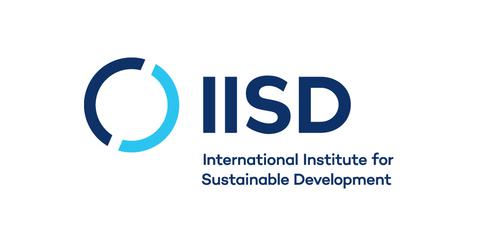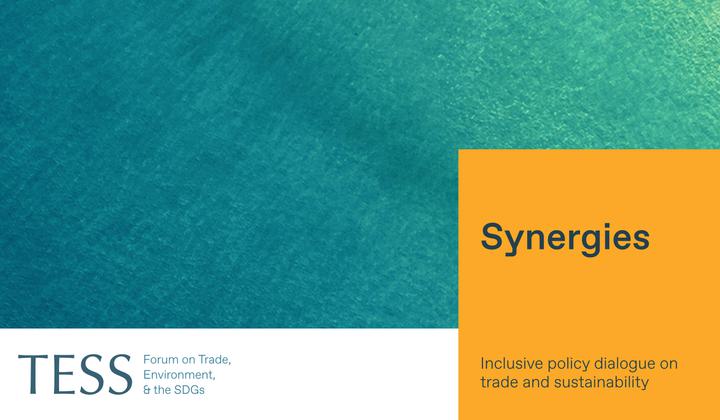TESS, CUTS International Geneva, the International Institute for Sustainable Development, and the United Kingdom’s Foreign, Commonwealth and Development Office co-hosted a session on “Greening Aid for Trade: Priorities and pathways for a just transition to sustainable trade” during the Aid for Trade Global Review 2022 in Geneva.
As governments and stakeholders work to promote the massive economic transformations that sustainability requires, trade and trade policy have a critical role to play. Amidst growing pressure for increased action on urgent global crises of biodiversity, climate, and pollution, there are also calls to “green” the global economy and trade. To support developing countries in a just transition to more sustainable trade, aid for trade has a key role to play in ensuring that trade serves all three dimensions of sustainable development – economic, social, and environmental.
The importance of trade-related capacity building and technical assistance on matters of sustainability, including its environmental dimensions, is a recurring theme of discussions in the WTO’s Committee on Trade and Environment and its Committee on Trade and Development. In the Ministerial outcome document from the recent 12th WTO Ministerial Conference, members highlighted the importance of providing relevant support to developing country members, especially LDCs, to achieve sustainable development, including through technological innovations. In December 2021, the importance of aid for trade was also highlighted in Ministerial Statements on Trade and Environmental Sustainability (cosponsored by 74 WTO Members) and on Plastic Pollution and Environmentally Sustainable Plastics Trade (cosponsored by 72 WTO Members).
As WTO members and stakeholders review progress to date and prepare the Aid for Trade (A4T) work program for 2022 onward, focused attention on how best to strengthen A4T and cooperation on environmental issues as a key pillar of sustainable trade will be critical to advancing a green, resilient, and inclusive global economy.
Summary
Speakers Highlighted Challenges and Opportunities in Regard to
- Ensuring that A4T monitoring systems accurately capture and report information about the environmental purposes, dimensions, and impacts of A4T projects.
- Integrating trade considerations into existing climate change and environmental funding initiatives, as well as in development assistance for sectors with a high environmental impact and trade dimensions, ranging from the blue economy to agriculture and tourism.
- Providing new and additional financing for environment-related A4T activities that support sustainable trade strategies in line with the priorities of developing countries, such as economic diversification and resilience.
- Linking A4T with wider efforts to finance a just transition to a green global economy, including trade finance, environment-related development assistance, climate finance, debt relief, and private sector investment, with a view to increasing both the quantity and quality of all of them.
- Strengthening South-South cooperation on sustainable trade, including by learning from developing countries experiences and existing practices.
- Mainstreaming environmental considerations across A4T programmes and projects.
Speakers Also Identified Specific Pathways Forward, Exploring How Aid for Trade Could
- address trade-related aspects of environmental challenges facing developing countries, including trade-related challenges related to climate mitigation and adaptation; pollution (such as plastic pollution); and tackling biodiversity loss.
- support economic opportunities and diversification in developing countries in ways that bolster their participation and competitiveness in green trade.
- increase climate-resilience and readiness of trade, as well as adaptation in the face of changing climatic conditions and recovery from climate shocks.
- support efforts in developing countries to harness the potential of circularity to generate sustainable development outcomes, addressing both the trade-related challenges and opportunities.
Agenda
Speakers
- H.E. Mr. Chad Blackman, Ambassador, Permanent Mission of Barbados to the United Nations Office and other International Organizations at Geneva
- H.E. Mr. Simon Manley, Ambassador and Permanent Representative, Permanent Mission of the United Kingdom of Great Britain and Northern Ireland to the United Nations Office and other international organizations in Geneva
- H.E. Dr. Muhammad Mujtaba Piracha, Ambassador and Permanent Representative Permanent Mission of Islamic Republic of Pakistan to the WTO
- Carolyn Deere Birkbeck, Director, Forum on Trade, Environment & the SDGs (TESS). Click here, to view her presentation.
- Steven Stone, Deputy Director, Economy Division, UN Environment Programme (UNEP)
- Yasmin Ismail, Programme Officer, CUTS International Geneva. Click here, to view her presentation.
Moderator
- Alice Tipping, Lead, Sustainable Trade and Fisheries Subsidies IISD
- Rashid Kaukab, Executive Director, CUTS International Geneva
Greening Aid for Trade
You can view this video of a working session on “Greening Aid for Trade: Priorities and pathways for a just transition to sustainable trade” during the Aid for Trade Global Review 2022 in Geneva.








